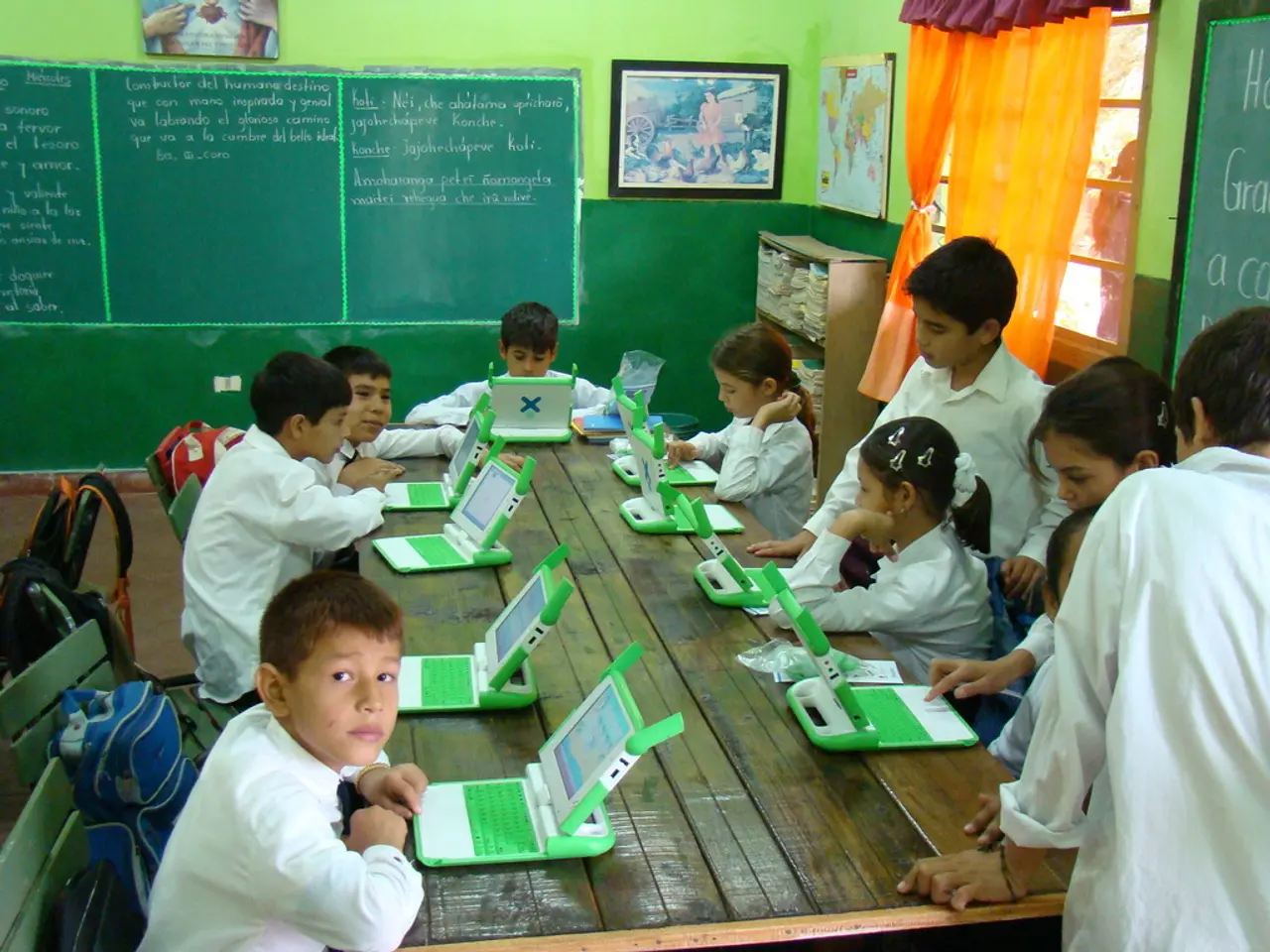"After five years, NEP 2020 paves the way for innovation in India's educational opportunities"
The National Education Policy (NEP) 2020 of India, now in its sixth year of implementation, continues to drive significant changes in the country's education system, focusing on transformation, inclusivity, digital tools, and vocational training:
- Transforming Learning Experiences: The policy has replaced the old 10+2 system with a new 5+3+3+4 structure, emphasizing foundational literacy and numeracy. It promotes a flexible, multidisciplinary curriculum, with no rigid separation among academic, vocational, and extracurricular streams [1][3][4].
- Inclusivity and Equity: The NEP aims to universalize education from preschool to secondary level with 100% Gross Enrollment Ratio (GER) by 2030, targeting the reintegration of 2 crore out-of-school children. It establishes a Gender Inclusion Fund and Special Education Zones for disadvantaged regions and groups to promote inclusive education. Teaching up to Grade 5 is encouraged in mother tongue or regional languages to foster inclusivity [1][3][4].
- Vocational Training: Vocational education is integrated into mainstream education starting from Class 6, with internships to blend practical skills with formal education. The policy supports the removal of rigid academic streams, enabling vocational, academic, and extracurricular learning to coexist and complement each other [1][2][3].
- Digital Tools and Technology Integration: The NEP 2020 advocates for increased use of technology in education with equity through the creation of a National Educational Technology Forum for sharing resources and best practices. It supports the development of digital infrastructure, AI-based learning, and online as well as distance education to enhance accessibility and flexibility for learners across India [1][2][3].
Other notable aspects of the NEP include: - The establishment of an academic bank of credits for credit transfer and multiple entry-exit points in higher education, allowing flexible learning paths [1][3]. - The promotion of multilingualism, including new institutes for Indian languages and translation [1]. - Professional development and training of teachers with National Professional Standards for Teachers to improve teaching quality and adapt to new methods [2][3].
Higher education under the policy now embraces flexibility and AI apprenticeships, providing opportunities for students to gain practical, industry-relevant skills. These initiatives represent a comprehensive reform aimed at making the education system more holistic, accessible, flexible, and aligned with modern needs while addressing equity and skill development across India.
[1] Ministry of Education, Government of India (2020). National Education Policy 2020. Retrieved from https://www.mhrd.gov.in/sites/upload_files/mhrd/files/NEP_2020_Final_English_0.pdf [2] Ministry of Education, Government of India (2021). National Education Policy 2020: Annual Report 2020-21. Retrieved from https://www.mhrd.gov.in/sites/upload_files/mhrd/files/Annual-Report-2020-21.pdf [3] Ministry of Education, Government of India (2022). National Education Policy 2020: Annual Report 2021-22. Retrieved from https://www.mhrd.gov.in/sites/upload_files/mhrd/files/National-Education-Policy-2020-Annual-Report-2021-22.pdf [4] Ministry of Education, Government of India (2023). National Education Policy 2020: Annual Report 2022-23. Retrieved from https://www.mhrd.gov.in/sites/upload_files/mhrd/files/National-Education-Policy-2020-Annual-Report-2022-23.pdf
- In the realm of policy-and-legislation, the National Education Policy (NEP) 2020, a comprehensive educational reform, has introduced significant changes in India, focusing on transformation, inclusivity, digital tools, and vocational training [1][2][3].
- General-news outlets frequently report on the progress of the NEP 2020, including its impact on the education-and-self-development sector, with a particular emphasis on its provisions for multilingualism, flexible learning paths, and professional development of teachers [1][2][3].
- The implementation of the NEP 2020 has also sparked discussions in the politics of education, with debates centered around its ability to adapt to modern needs, its effectiveness in addressing equity, and the role of digital tools in enhancing learning experiences [1][2][3].




